FBI Director
| Director of the Federal Bureau of Investigation |
|
|---|---|

Seal of the Federal Bureau of Investigation
|
|

Flag of the Federal Bureau of Investigation
|
|
|
U.S. Department of Justice Federal Bureau of Investigation |
|
| Reports to |
Attorney General Director of National Intelligence |
| Seat | J. Edgar Hoover Building, District of Columbia, U.S. |
| Appointer | The President with Senate advice and consent |
| Term length | 10 years |
| Inaugural holder |
Stanley Finch (BOI) J. Edgar Hoover (FBI) |
| Formation | 1908 (as Chief of the BOI) |
| Deputy | Deputy Director |
| Website | www.fbi.gov |
The Director of the Federal Bureau of Investigation is the head of that agency (FBI) and responsible for its day-to-day operations. The FBI Director is appointed by the President and confirmed by the Senate.
The current Director of the FBI is James Comey, who assumed office on September 4, 2013.
Along with the Deputy Director, the Director ensures cases and operations are handled correctly. The Director also is in charge of staffing the leadership in any one of the FBI field offices with qualified agents. The Director briefed the president on any issues that arose from within the FBI until the Intelligence Reform and Terrorism Prevention Act of 2004 was enacted in response to the September 11 attacks. Since then, the Director reports to the Director of National Intelligence, who in turn reports to the President. The Director is also supervised by the Attorney General, as the FBI is an agency of the Department of Justice.
When the Bureau of Investigation (BOI) was established in 1908, its head was called the Chief of the Bureau of Investigation. It was changed to the Director of the Bureau of Investigation since the term of William J. Flynn (1919–1921), and to its current name when the BOI was renamed FBI in 1935.
The FBI Director is appointed by the President and confirmed by the Senate.J. Edgar Hoover, appointed by Calvin Coolidge to the predecessor office of Director of the Bureau of Investigation in 1924, was by far the longest-serving director; he held the position from its establishment under the current title in 1935 until his death in 1972. In response to Hoover's lengthy tenure, Congress imposed a term limit of ten years for future directors, which was waived by the Senate for Robert Mueller on July 27, 2011 due to serious security concerns at that time. In theory, they serve ten-year terms unless they resign, die, or are removed, but in reality, since J. Edgar Hoover, none have served a full ten years, except Robert Mueller, who served twelve years.
...
Wikipedia

